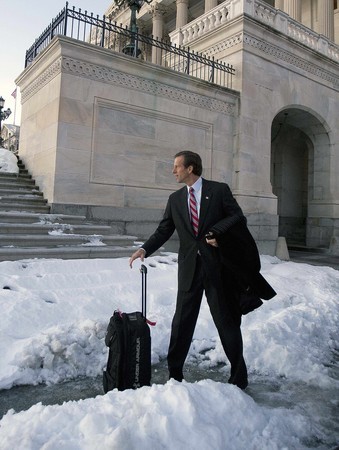Democrats hail passage of health bill
WASHINGTON -- The U.S. Senate capped 25 days of debate on Christmas Eve by passing legislation that would alter the delivery and financing of health care for millions of Americans.
Senators voted 60-39 for the bill that was the product of compromise among factions of Democrats. Its passage was engineered by Majority Leader Harry Reid of Nevada, and was seen as a big step forward in fulfilling one of President Barack Obama's major priorities of health care reform.
All 58 Democratic senators and two independents voted for the final product, while all Republicans present voted against it. One Republican, retiring Sen. Jim Bunning of Kentucky, did not vote.
Democrats hailed the bill as the most momentous health measure since Medicare was established in 1965, or perhaps when Social Security was instituted in 1935.
Republicans protested the bill will hasten the nation's ruin. They charged it will run up health costs through taxes and increases on premiums, further deepen federal deficits and involve "big government" more deeply in health care.
Reid voted for the bill. Sen. John Ensign, R-Nev., voted against it.
The bill aims to make health coverage available to more than 30 million uninsured people by 2019 by setting up marketplaces, or exchanges, where people could purchase plans, with government subsidies if necessary.
Individuals would need to buy coverage by 2016 or pay a penalty.
At the same time, Medicaid would be expanded to cover more low-income individuals and families.
The measure also contains a suite of insurance reforms that would be phased over several years. Insurance companies would no longer be able to deny coverage to someone with pre-existing health problems, nor charge different premiums based on gender or their health conditions.
It also would establish a permanent independent commission with powers to implement cost-saving changes in Medicare.
Among a variety of issues, Democrats debated abortion coverage and reached a deal on new limits. They debated whether there should be "public option" government-sponsored health insurance and decided no, and whether to expand Medicare to cover middle-aged people, and decided no there as well.
Leaders now will negotiate the Senate bill with a version the House passed in November. Among differences is how each chamber would address coverage for abortions, and how each would pay for the sweeping changes.
The Senate bill was projected to cost $871 billion, and would be paid for largely through cuts in the growth of Medicare spending and taxes on "gold plated" insurance plans.
The House version, which seeks to cover 6 million more people, was estimated at $1 trillion. It would be financed with Medicare cuts and by new taxes on people earning more than $500,000 a year.
DEBT LIMIT INCREASED
Before recessing for the holidays, the Senate voted 60-39 to allow the U.S. Treasury to borrow another $290 billion, enough to keep the government from financial default until Congress returns next month.
The bill would increase the $12.1 trillion debt limit to $12.39 trillion. Supporters said the Senate had no choice but to pass the bill, as world finance would shake if the United States was unable to pay interest on its bonds or borrow more money.
"Think of what it would mean to global markets if the United States were to default on $12 trillion of debt," said Sen. Kent Conrad, D-N.D. "The consequences for this country and the global economy would be nothing short of catastrophic."
Sen. John Thune, R-S.D., said the vote was an indicator of how Congress, both under Republican and Democratic control, has been unable to control spending.
"At some point around here, people have to own up and take responsibility for their own decisions," he said.
Reid voted to raise the debt limit. Ensign voted against it.
Contact Stephens Media Bureau Chief Steve Tetreault at stetreault@stephensmedia.com or 202-783-1760.

















